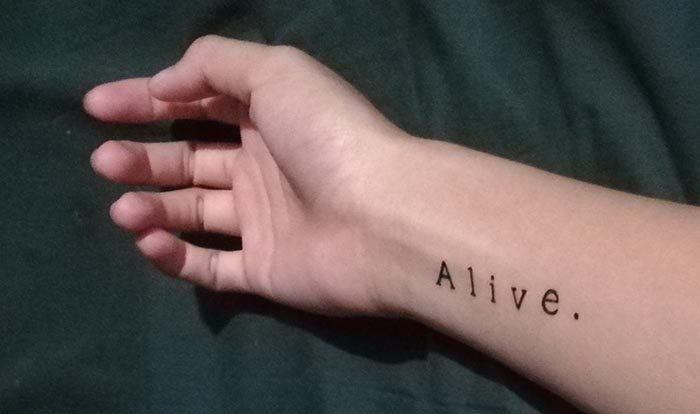The shiny razor in my hand is becoming more appealing as the night drags on.
It is 8:30 p.m. on a Friday night. The year is 2009, and I’m sitting in a small bathroom inside of the community living residence that I call home.
My community living residence is one that offers housing to those ages 16 to 24 who have a history of mental health struggles, as well as those who are leaving the foster care system.
Needless to say, contemplating self-harm is very much against house rules.
Tell that to my crisis.
I feel numb inside.
I have been attending therapy regularly, and have been given a different diagnosis at each visit over the last six months. The diagnoses have been as follows:
>> Major depression,
>> Major anxiety,
>> Bipolar disorder,
>> Schizophrenia,
>> And finally back to major depression.
With all these has come a slew of pretty, colored pills ranging from anti-anxiety medication to anti-psychotics. All came with side effects worse than my emotional and mental need for them.
None fixed the issue at hand.
I have no control over my life. My mind is really good at making me feel this way.
The razor has caused a crimson looking smile on my upper, left arm, and my house manager is beating on the bathroom door. They ask me if I am okay, I give a faint yeah, but she doesn’t buy it. You see, my self–harm is being looked at here as a wish to die. Not as the cry for help or attention I meant it to be. Before I can clean myself up and open the door, my house manager has called 911.
Calling 911 not only sent out a bat signal to the world that Meagon wanted to die (not true) but also that Meagon was no longer able to make decisions about her well-being alone and therefore would be carted off via ambulance to the psychiatric ward to await evaluation (this is, unfortunately, true).
So, you can maybe understand my surprise when I was met outside of the house by two policemen. These policemen proceeded to approach me, handcuff me, sit me down on the curb, and begin asking me questions. Apparently, no ambulance could respond, so they’d sent these two.
Long story short, my night ended with a face full of pepper spray and a one-way ticket to the psychiatric ward, handcuffed in the back of a police car.
Why do police respond to mental health crises?
Your guess is as good as mine. Your alarm is probably right there with mine as well.
Police are not equipped, nor is it a focus of their training to effectively handle those with mental health concerns. Especially not in this era of shoot first, ask questions never.
According to the Treatment Advocacy Center, those with an untreated mental health diagnosis are 16 times more likely to be killed during a police encounter than those without a mental health diagnosis. Say that twice out loud.
Also, those with an untreated mental health illness account for half of all fatal police shootings. Let me repeat: those with an untreated mental health illness account for half of all fatal police shootings.
~
“Every human is the author of his own health or disease.” ~ Swami Sivananda
~
All those years ago, when I was in the throes of my mental illness, I never understood why, when I was begging for help, I was met with violence.
Now, as a mental health professional, my heart bleeds for those dealing with a crisis when the only call they can make means they lose their right to choose their treatment. They lose their right to be met with compassion and instead are met with the unnerving sight of law enforcement.
I consider myself lucky because I have only met this fate once in my life.
What about the young man experiencing his first psychotic break with schizophrenia—when his mind begins instructing him to do things that may harm himself or others? Who does he call for comfort?
What about the young girl who has experienced lifelong abuse, and self-harm feels like the only means of control she has in her life?
What about the individuals who would rather scar themselves then dig into the scars they harbor inside?
Most mental health professionals are required to be mandated reporters. This means that if someone tells them they want to hurt themselves or others, they are required to report this. The outcome is generally a forced hospitalization.
And, more often than not, guess who arrives first to these scenes of crisis?
Bingo: the police.
So, what happens when an individual goes through this a couple of times, then is in crisis again? Does the treatment they receive help shock them enough that they self-soothe their demons and remove crisis from the equation?
Sadly, this is rarely the case.
They just stop calling. They stop asking for help. They stop seeing any light at the end of the tunnel. They sometimes think that death might be better than the help being offered. Please, read this paragraph over and over until it causes you to shed tears as I am.
Our mental health protocol for a crisis is so unbearable and scary that they would rather take their life than ask anyone to help save it anymore.
I ask you to be the change this system needs.
Have a suicidal friend who calls you saying they no longer want to live? Sit in that discomfort with them.
Maybe a coworker shares with you that they are a cutter. Sit them down and let them know you are with them in this fight.
Or, maybe you are a mental health professional and your client just stated his voices told him to kill himself today. Put your mandated reporter hat down briefly, and instead sport your cap of compassion.
The same way we ask you to not hastily or casually call the police on people of color because their life is at stake, I ask you to offer the same thoughtfulness and consideration to our brethren struggling within their minds.
We all have a story. Do not be the ending to someone’s when you could instead be the bright new beginning.












Read 4 comments and reply